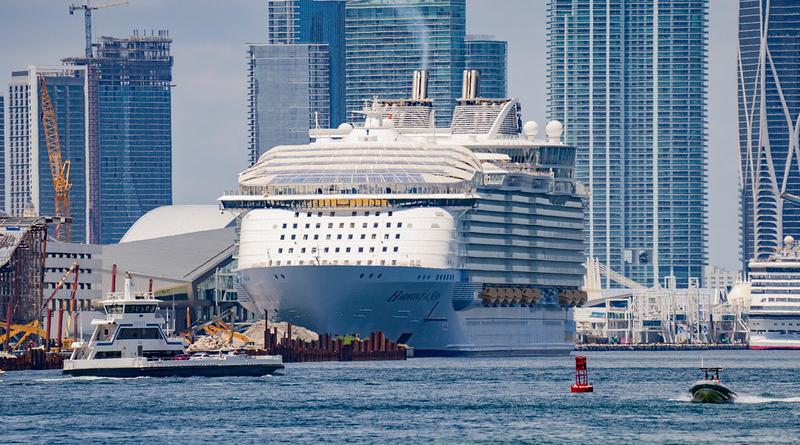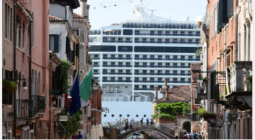The cruise industry says LNG is a climate solution. It’s not

On my way home from a recent holiday in France, I drove past Saint Nazaire shipyard. On the dry dock, dwarfing everything around it, was Royal Caribbean’s new cruise ship under construction – Utopia of the Seas. It will be the company’s first cruise ship in its class to be powered by liquified natural gas, or LNG.
LNG is a fossil fuel whose use is not consistent with the Paris Agreement 1.5C temperature goal. It consists primarily of methane, an extremely powerful greenhouse gas (GHG), which has climate impacts over 80 times greater than carbon dioxide over a 20-year period. Methane leaks into the atmosphere across the full production lifecycle of LNG, and once on the ships, the unburned gas escapes from the smokestacks into the air.
Despite the devastating frontloaded climate impact of methane, to date policymakers have been slow to address its use in regulation, and public awareness of the issue is low. This gives cruise companies the latitude to invest in LNG as an alternative fuel – and they have done so with gusto.
Why do cruise companies love LNG?
There are some benefits to LNG on paper: in the short term it reduces air pollution and CO2 emissions when burned, compared to standard shipping fuel. This has led to some of the world’s biggest cruise companies (including Carnival Corporation & plc and MSC Cruises and Royal Caribbean Group) to portray their cruises as sustainable, and their newest ships “clean”, “green” and “eco-friendly”.
Across the industry, company webpages are littered with references to LNG superimposed on images of idyllic blue seas, thriving coral reefs, and green forests. Most of us aren’t specialists in the climate impacts of differing fuel compositions, and it’s easy to be taken in.
But the reality is that these adverts are a very effective smokescreen for the fact that the true climate effect of LNG is likely worse than if the companies had stuck with dirty heavy marine fuel oil.
Calling out cruise companies’ ‘green’ claims
With recent poll data demonstrating that environmentally friendly cruise line policies mattered to 77% of respondents, and US research relating to consumer goods showing a link between products making green claims and higher sales growth, it’s clear that sustainability sells.
We don’t think it’s right that some of the biggest companies in the world should be able to profit from green claims that don’t stack up.
That’s why at Opportunity Green we’re filing complaints to the Advertising Standards Authority (ASA) in the UK about the worst advertising we’ve seen. This includes cruise companies claiming that fossil-LNG is “a breakthrough green technology”, “among the cleanest fuels in the world”, and that it is a milestone on the “journey to zero emissions operations”.
It is not ok to mislead consumers about the real climate impact of LNG. And in the absence of effective regulation of methane emissions in the shipping sector, we want companies and their investors to see that LNG is not part of a future-proof business model.
Instead, forward-looking companies must be investing in true zero emissions solutions such as wind propulsion, electrification and e-fuels made from renewable energy such as methanol, ammonia or hydrogen to deal with climate transition risk.
Truly decarbonising the cruise sector won’t be easy, but these companies have the market share to make a difference – and the first mover advantage could be significant. It might even be ‘green’.
For more information about how cruise companies are is trying to gaslight the public into believing that LNG is a climate solution, read the full report, (UN)sustainable from ship to shore.
Carly Hicks is legal director at Opportunity Green.





